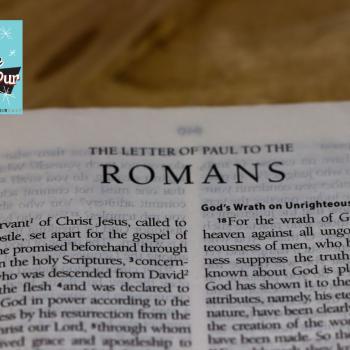The Bible can be used to justify just about anything. If you so choose, you can develop any sort of doctrine you want based on things “plainly” taught in the Bible. The one I am going to focus on in this article is the practice of sacrifice. For many Christians, a God who demands sacrifice is essential to the faith. Entire systems of theology are centered on this practice. So, let us take a look at this “plain teaching” from Scripture a little more closely.
The first mention of sacrifice is found in Genesis 4:3, which reads: “In the course of time Cain brought to the Lord an offering of the fruit of the ground.” It is interesting to note that sacrifice is already presupposed, as there is yet (as of Genesis 4:3) to be any mention that God desires it. Regardless, because of this practice, competition for God’s favor—for the better sacrifice—leads directly to envy and death. This is how culture is created. It is how the writer of Genesis describes the founding of the first city (see Genesis 4:16 – 17).[1] The Greeks would later describe the principle that structured our civilizations as the logos. Heraclitus (c. 535 – c. 475 BCE) said violence—“war and conflict” specifically—is “the father of all things.” (Gil Bailie, Violence Unveiled, Ch. 13) Genesis 4 gives us strong hints as to how this principle is structured, with sacrifice a key ingredient in the process. The Book of Leviticus tells us just how complex sacrifice then became in the Jewish faith.
The Book of Leviticus, which is central to Judaism, begins with all the various ways in which sacrifice is to be performed. Chapter 1 is blood offerings. Chapter 2: grain. This goes on and on and is quite precise throughout. To those who look for “plain truths” in Scripture, nothing is plainer than the importance of the sacrificial system in the Jewish religion. What is interesting then, as things progress and move forward, is that you have prophets who begin to question the sacrificial apparatus. Jeremiah 7:22 – 23 states:
“For in the day that I brought your ancestors out of the land of Egypt, I did not speak to them or command them concerning burnt offerings and sacrifices. But this command I gave them, ‘Obey my voice, and I will be your God, and you shall be my people; and walk only in the way that I command you, so that it may be well with you.’” NRSV
If you are looking for a “plain teaching” vis-à-vis sacrifice, you are not going to get it at this point (short of adding the word “just” in v. 22; like the translators of the NIV did. Jeremiah 7:22, in the NIV, reads: “For when I brought your ancestors out of Egypt and spoke to them, I did not just [emphasis mine] give them commands about burnt offerings and sacrifices.”). For me, this question remains: Did Yahweh give Moses the commands regarding sacrifice or, as Jeremiah states, did he not?
Then, if you go to the Epistle to the Hebrews, you will again read that the Law requires blood in order for forgiveness to occur (Hebrews 9:22). Nobody should dispute that. However, if you continue on to Hebrews 10:5 – 7 (referencing the anti-sacrificial Psalm 40:6 – 8), you will discover that the sacrificial aspects of the Law were not something the Father ever desired—it was unpleasing even. (See also Amos 5:21 – 22 for God’s apparent disapproval of “festivals” and “burnt and grain offerings”) In fact, in verse 8, the writer goes so far to write: “You have neither desired nor taken pleasure in sacrifices and offerings and burnt offerings and sin offerings (these are offered according to the law).” Even though such things are offered according to the Law, they were not desired by God. This passage seems right in line with that of Jeremiah 7:22. However, it still is not so plain, is it?
Now, the last thing I would like to leave you with is a comment on the death of Jesus. I do so because it is the presupposed belief in a God who demands sacrifice that leads most Western Christians to conclude the Father demanded his Son become “the perfect sacrifice.” Because of humanity’s sin—our fall—the Father must have his Son die in order to then offer forgiveness. This has many negative implications so I would like us to meditate on Jesus’ death and whom the sacrifice actually appeased.
On multiple occasions in the Book of Acts, it is “clearly stated” that we killed Jesus (2:23, 3:14 – 15, 4:10) but that the Father raised him from the dead (2:24, 3:15, 4:10). Andre Rabe puts it this way: “Man does the killing and God does the making alive!” (Rabe, Desire Found Me, 224)
It is ironic that it is John Calvin—a lawyer—who popularizes the Penal Substitution Atonement theory. Sure, it makes sense a lawyer would think of things in terms of the human justice system, but in light of all real-world evidence, is it not obvious humanity is 100% guilty of the murder? Is Jesus not betrayed by a human named Judas? Is he not handed over to the crowd’s desires by Pilate? Is he not flogged by men with clubs and whips? Is he not placed on the almighty Roman cross—the symbol of the power of empire? Of course he is.
If anything is clear, it is that humanity killed Jesus. What is not so clear is why. Most believe it is because his Father needed a perfect sacrifice, but the convincing reason for such a belief remains unclear. There are plenty of pro-sacrificial passages throughout, but, as René Girard says, it is not a “cut and dried thing.” (Hamerton-Kelly, Violent Origins, 141) There are also plenty of anti-sacrificial passages that seem to undermine the “pro” stance.
Surely, something as important as the Bible needs to be taken more seriously than simply giving it a “plain reading.” I hope Western Christianity (broadly speaking) can give up that hermeneutic, one that strips the spirit of the Scriptures of all life. The flat reading must be exchanged for the anti-vengeance, anti-sacrificial hermeneutic Jesus, Paul, and the writer of Hebrews used. I do not believe the “Bible clearly says” much, but I do believe Jesus clearly says to “follow him.” (Matthew 4:19, 16:24) We need to follow him in action and in hermeneutics—forever eliminating our sacrificial lens.
[1] This would be similar to the founding myth of Rome, where Romulus slays his brother Remus over the interpretation of an omen.

















